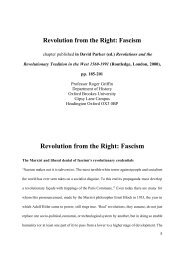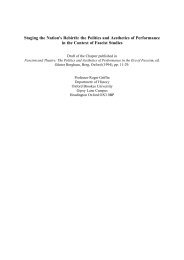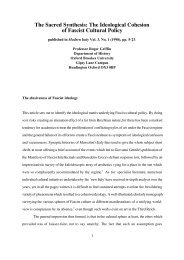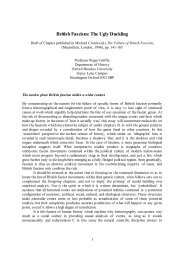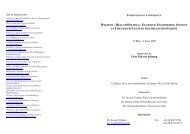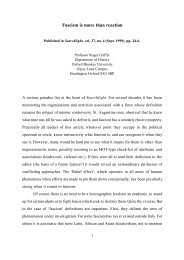The palingenetic core of generic fascist ideology - School of Arts and ...
The palingenetic core of generic fascist ideology - School of Arts and ...
The palingenetic core of generic fascist ideology - School of Arts and ...
Create successful ePaper yourself
Turn your PDF publications into a flip-book with our unique Google optimized e-Paper software.
scientists in this volume: 4 in the best tradition <strong>of</strong> wine-tasting it should at least be<br />
given time to leave a bouquet in the mouth before being spat out. To pursue the<br />
analogy further, my own contribution might be compared to an Australian wine from<br />
a recently established vineyard, rather than a vintage di origine controllata. It will<br />
hopefully prepare those unfamiliar with my work for its distinctive flavour if I place<br />
it within the context <strong>of</strong> a significant development which I believe has taken place in<br />
the last decade within the convoluted debate concerning the existence <strong>and</strong> nature <strong>of</strong><br />
‘<strong>generic</strong> fascism’, a topic over which enormous quantities <strong>of</strong> printer’s ink <strong>and</strong><br />
cartridge toner have been consumed since 1945.<br />
When I entered the debate as an ingénu some ten years ago articles <strong>and</strong><br />
essays on <strong>generic</strong> fascism regularly opened with a ritual lament about the chronic lack<br />
<strong>of</strong> consensus on even the most basic definitional issues raised by the concept. Every<br />
attempt made by a non-Marxist scholar since the 1920s to <strong>of</strong>fer a way out <strong>of</strong> the<br />
conceptual labyrinth posed by fascism seemed only to have enlarged <strong>and</strong><br />
complicated it further, with the result that historians attempting to study aspects <strong>of</strong><br />
the <strong>generic</strong> phenomenon ‘idiographically’ were generally at a loss as to which<br />
‘expert’ to turn for a working definition (most chose wisely to avoid the subject<br />
altogether). In the course <strong>of</strong> the 1990s the situation changed beyond recognition.<br />
Certainly books repackaging conventional Marxist orthodoxies 5 or perpetuating the<br />
traditional confusion 6 are still published sporadically, <strong>and</strong> every so <strong>of</strong>ten the debate<br />
is enlivened by the appearance <strong>of</strong> a monograph <strong>of</strong>fering a maverick approach. 7 But<br />
there has been an unmistakable tendency for recent contributions both to<br />
conceptualizing fascism, <strong>and</strong>, just as important, to underst<strong>and</strong>ing concrete aspects<br />
<strong>of</strong> its historical manifestation, to converge on a cluster <strong>of</strong> axioms. It would appear<br />
that, at least for the present fascism is, as the academic Newspeak would have it,<br />
becoming a less ‘contested’ concept. 8<br />
<strong>The</strong> broad area <strong>of</strong> scholarly consensus 9 which now exists, admittedly one<br />
with highly fuzzy boundaries, is that: fascism is best approached as a genuinely<br />
revolutionary, trans-class form <strong>of</strong> anti-liberal, <strong>and</strong> in the last analysis, anti-<br />
conservative nationalism. As such it is an <strong>ideology</strong> deeply bound up with<br />
modernization <strong>and</strong> modernity, one which has assumed a considerable variety <strong>of</strong><br />
external forms to adapt itself to the particular historical <strong>and</strong> national context in which<br />
2




